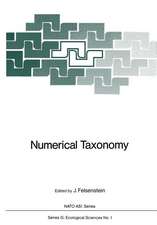Inferring Phylogenies
Autor Joseph Felsensteinen Limba Engleză Paperback – 4 sep 2003
Preț: 921.78 lei
Preț vechi: 1175.83 lei
-22% Nou
Puncte Express: 1383
Preț estimativ în valută:
176.41€ • 183.49$ • 145.63£
176.41€ • 183.49$ • 145.63£
Carte tipărită la comandă
Livrare economică 01-07 aprilie
Preluare comenzi: 021 569.72.76
Specificații
ISBN-13: 9780878931774
ISBN-10: 0878931775
Pagini: 580
Dimensiuni: 230 x 179 x 24 mm
Greutate: 0.95 kg
Editura: Oxford University Press
Colecția OUP USA
Locul publicării:New York, United States
ISBN-10: 0878931775
Pagini: 580
Dimensiuni: 230 x 179 x 24 mm
Greutate: 0.95 kg
Editura: Oxford University Press
Colecția OUP USA
Locul publicării:New York, United States
Recenzii
Joe Felsenstein has had more positive influence on the statistical revolution of phylogenetics than any other researcher in the field. For that reason, many biologists view him as the father of statistical phylogenetics. It was with this in mind that I finally got my hands on his long-awaited book, Inferring Phylogenies. The short answer is: it delivers. Inferring Phylogenies is quite simply an instant classic.
The book is full of expert insights, as one would expect from an author who has made important original contributions to many of the areas he covers. Felsenstein provides beautiful and creative accounts of many topics. It will be a long time before there will be a comparable book; perhaps the field is now growing too fast for there to ever be one. The publication of Inferring Phylogenies is a milestone for evolutionary biology in general and phylogenetics in particular.
The author certainly sets out with an ambitious goal: to survey, in one book, the field of phylogenetics since computational methods entered the arena forty years ago, and he amply delivers on this promise. For researchers new to this area, the book describes contemporary methodology in a way that is both accessible and authoritative. For 'old hands,' it provides a wealth of background and commentary.
Occasionally a book is a classic by the time it is published, and this is it. The breadth is very wide with all the main expected topics. It is hard to imagine how any lab could function without this book.
Felsenstein's book represents a truly majestic discussion of the inference and applications of phylogenetic trees. The power of this volume lies in its unique combination of an accessible style with undoubted intellectual authority. Over 30 years ago Crow and Kimura produced what has become the cornerstone of theoretical population genetics. Felsenstein has now given us the definitive resource for anyone interested in phylogenetics. This volume is an outstanding achievement.
The book is full of expert insights, as one would expect from an author who has made important original contributions to many of the areas he covers. Felsenstein provides beautiful and creative accounts of many topics. It will be a long time before there will be a comparable book; perhaps the field is now growing too fast for there to ever be one. The publication of Inferring Phylogenies is a milestone for evolutionary biology in general and phylogenetics in particular.
The author certainly sets out with an ambitious goal: to survey, in one book, the field of phylogenetics since computational methods entered the arena forty years ago, and he amply delivers on this promise. For researchers new to this area, the book describes contemporary methodology in a way that is both accessible and authoritative. For 'old hands,' it provides a wealth of background and commentary.
Occasionally a book is a classic by the time it is published, and this is it. The breadth is very wide with all the main expected topics. It is hard to imagine how any lab could function without this book.
Felsenstein's book represents a truly majestic discussion of the inference and applications of phylogenetic trees. The power of this volume lies in its unique combination of an accessible style with undoubted intellectual authority. Over 30 years ago Crow and Kimura produced what has become the cornerstone of theoretical population genetics. Felsenstein has now given us the definitive resource for anyone interested in phylogenetics. This volume is an outstanding achievement.
Notă biografică
Joe Felsenstein is Professor in the Department of Genome Sciences at the University of Washington, Seattle, where he has taught for more than thirty years. He earned a B.S. (Honors) in Zoology from the University of Wisconsin, Madison, and a Ph.D. in Zoology from the University of Chicago. Dr. Felsenstein is the author of the widely used PHYLIP package of programs for inferring phylogenies. He served as President of the Society for the Study of Evolution in 1993 and has received numerous awards, including: election to membership in the American Academy of Arts and Sciences (1992); the Sewall Wright Award, American Society of Naturalists (1993; election to membership in the National Academy of Sciences (1999); and the Weldon Memorial Prize, Oxford University (2000). His work has ranged from theoretical evolutionary genetics to statistical methods for inferring phylogenies.











